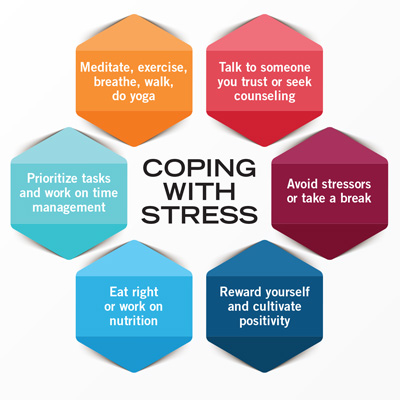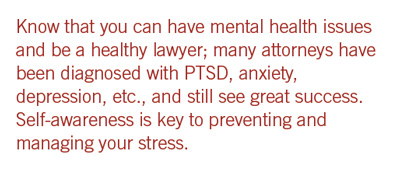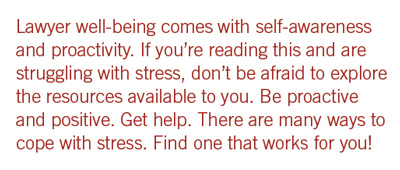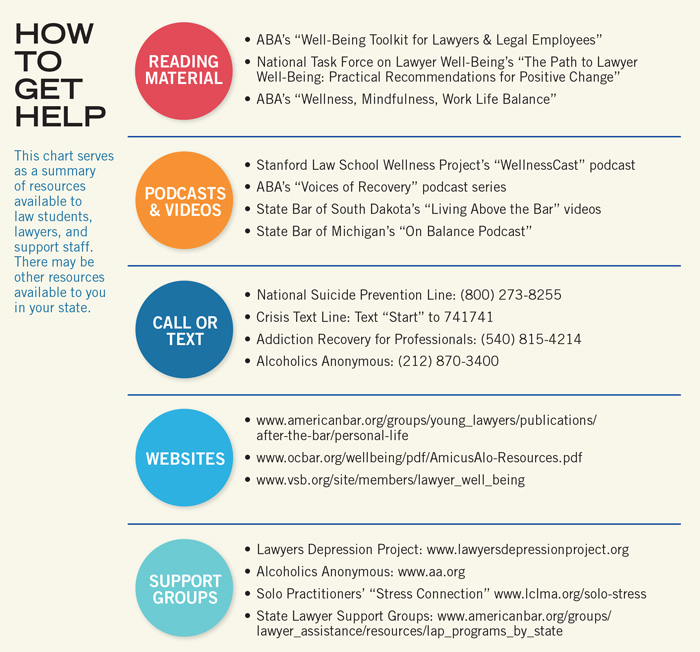Stress Success
The Bencher—March/April 2020
By Jenna C. Jordan
 The Stress Lurking Beneath Our Success
The Stress Lurking Beneath Our Success
Who knew that being a lawyer could be so stressful or that the image of success had so much lurking beneath? Although lawyering is one of the most sought-after professions, it comes with the highest suicide and substance abuse rates of any profession. One in three lawyers will suffer from substance abuse. One in three lawyers will have a serious mental disorder. Lawyers are about four times more likely to experience depression than non-lawyers, and lawyers rank among the fifth most likely occupations to end their lives. Most appalling is that 7 in 10 lawyers said if they could do it all again, they would choose a different profession.
Why Are Lawyers So Stressed?
It is well-established that being a lawyer is stressful. Stress is a physical, mental, and emotional response to the events of life that can become harmful and may lead to serious health problems, such as depression or heart disease. Many things can cause a lawyer to experience stress in his or her career, including a toxic work environment, long work hours, extensive billable hour requirements, clients (or other lawyers) with unreasonable expectations, or opposing counsel’s civility, to name a few. Stress leads to unhappiness, which can lead to career burnout and other ethical consequences.
The human brain is not wired for constant stress. Rather, constant stress activates the amygdala, which sends signals to the hypothalamus and produces the “fight or flight” response. This can trigger the release of adrenaline and lead to increased heart rate, increased blood pressure, and rapid breathing. When the amygdala responds in this way, an intense and unconscious emotional response shuts off the cortex, which makes it hard for us to think clearly.
Lawyers work around the clock to solve problems and read cases that require complete concentration. We may not realize how the amygdala impairs us for hours after we encounter stress. A lawyer’s amygdala fires more often than it should. With demanding jobs leaving no time for breaks to allow our amygdalae to stop firing, we will have difficulties problem-solving and concentrating. Once the amygdala fires, it’s more likely to fire again and again. We must take breaks to separate ourselves from stress and our brains’ responses to it. It takes about 20 minutes for the amygdala to cease firing and for normal cortex functioning to resume. But enough science—we’re lawyers.
Law Student and Young Lawyer Stress
It’s no surprise that young lawyers suffer from high stress situations more than other professions. You cannot become a lawyer overnight. Just to be eligible to sit for the bar exam, you must graduate from an undergraduate institution; take the LSAT; get accepted into law school; complete and pass 1L, 2L, and 3L years; pass the MPRE; and graduate from law school. Even then, those who desire to practice law must surmount the bar exam. You must also be deemed by the Board of Bar Examiners to have good character and fitness to act as a lawyer.
Many students had to take out extensive loans to pay for law school. The typical law student has an average student loan debt of $145,550—this number includes undergraduate loans. Even then, an entry-level attorney position salary in the U.S. pays only about $47,000 per year. Depending on your locale, your starting salary may be better or worse. About six months after graduation, student loan payments become due. You might be tempted to take the first job offer because of financial pressure. Once you take the job, you try not to commit malpractice. You try to be happy working in a job you may not particularly enjoy. You may work long hours and have little time off.
Those that fail the bar exam the first time have even more stress and pressure to pass the second time. They may no longer be in a place to take off work to study, and they likely have student loans coming due. When the advice for second-time takers is to try harder the second time, they might not have that luxury. It is important for anyone who did not pass to realize that you are not alone. Many people fail and have been successful after failing. It’s also important to know that the test does not define you; you’ve already come so far and you can pass and go on to be successful in whatever you do. If you don’t want to take it again, you don’t have to, but many are successful when they try a different method of studying or when different topics are tested. Work with someone to see where you fell short and overcome it for the next exam. Believe in yourself.
Law Firms, Well-Being, and Awareness
The stigma around mental illness and depression in the U.S. is huge, especially for attorneys. You might feel out of control as an attorney who’s supposed to solve problems, not have them. The general public only sees the tip of your iceberg, but look around and you’ll notice many attorneys have the same struggles.
Law firms should be active in preventing employee stress, depression, and suicide. Law firms have not traditionally seen well-being as an important part of the firm and its reputation. Most firms have a negative bias against hiring mental health professionals or implementing well-being programs. Firms have the option to eradicate the stigma behind mental health and make wellness a part of the firm’s culture. With this wellness training, both the financial strength and the reputation of the firm will improve. Firms should also make employees aware of the mental health services and benefits available to employees (such as counseling and insurance coverage), so that all employees have access. There should be a dialogue at every firm about mental health and the resources available and a designated person to go to with these concerns so that the firm knows about and can address them.
Iceberg Awareness—A (Mentally) Healthy Lawyer Is a Successful Lawyer
 Although others may look at us and see the tip of the iceberg only—our success—they might not see below the water to what lurks underneath: anxiety, depression, mood swings, substance abuse, eating disorders, upset stomachs, overwhelming feelings, lack of motivation and focus, relationship problems, family difficulties, working long hours, sleepless nights, work pressure, deadlines, migraines, fatigue, etc. Being aware of the high stress nature of the profession and being able to recognize your response to it is very important in managing your stress. To be a successful lawyer, you have to be an emotionally healthy lawyer. Know that you can have mental health issues and be a healthy lawyer; many attorneys have been diagnosed with PTSD, anxiety, depression, etc., and still see great success. Self-awareness is key to preventing and managing your stress.
Although others may look at us and see the tip of the iceberg only—our success—they might not see below the water to what lurks underneath: anxiety, depression, mood swings, substance abuse, eating disorders, upset stomachs, overwhelming feelings, lack of motivation and focus, relationship problems, family difficulties, working long hours, sleepless nights, work pressure, deadlines, migraines, fatigue, etc. Being aware of the high stress nature of the profession and being able to recognize your response to it is very important in managing your stress. To be a successful lawyer, you have to be an emotionally healthy lawyer. Know that you can have mental health issues and be a healthy lawyer; many attorneys have been diagnosed with PTSD, anxiety, depression, etc., and still see great success. Self-awareness is key to preventing and managing your stress.
 Lawyers are expected to work and be successful in adversarial environments. They have unpredictable schedules and are prone to pessimistic thinking, which often results in high success rates and becoming a better lawyer. However, this type of thinking is correlated with high rates of depression. Lawyers are also expected to solve diverse problems without flaw. The stigma behind mental health also discourages identification of the problem, discussions about it, and access to care. Chronic stress and depression can often trigger unhealthy behaviors, such as substance abuse and problems with personal life, which can lead to suicidal thoughts and even suicide.
Lawyers are expected to work and be successful in adversarial environments. They have unpredictable schedules and are prone to pessimistic thinking, which often results in high success rates and becoming a better lawyer. However, this type of thinking is correlated with high rates of depression. Lawyers are also expected to solve diverse problems without flaw. The stigma behind mental health also discourages identification of the problem, discussions about it, and access to care. Chronic stress and depression can often trigger unhealthy behaviors, such as substance abuse and problems with personal life, which can lead to suicidal thoughts and even suicide.
The warning signs of suicide are not always clear. Some people share their suicidal thoughts or plans to commit suicide, but others may keep it a secret. You should be looking for changes in people, such as excessive sadness, moodiness, or an expression of helplessness or feelings of defeat. You may notice someone acting differently, unable to keep composure and acting more agitated, or using substances as a coping mechanism. Other signs may include talk or jokes of suicide; withdrawing from family, friends, or coworkers; or seeking access to firearms or pills. Fifty to 75 percent of those considering suicide will give a type of warning sign. If you see warning signs, take them seriously. It is important to take action, as you may be the only one seeing the signs. Listen, remain calm, be direct, and assist someone in getting help.
Stress can lead to ethical violations because it impairs our thinking. When our thinking is impaired, we may act out of character or make a mistake. Lawyers have the ability to transform a person’s life, but too many lawyers suffer from chronic stress, anxiety, depression, and substance abuse, which can lead to competency issues. Stress can negatively affect our relationships with judges, clients, and other lawyers. Lawyer well-being influences ethics and professionalism, directly linking it to the Model Rules’ duties of competence, diligence, truthfulness, communication, and civility. Although lawyers might not be able to avoid  stressful situations, we can exert some control over how we adapt to or manage them.
stressful situations, we can exert some control over how we adapt to or manage them.
Lawyer well-being comes with self-awareness and proactivity. If you’re reading this and are struggling with stress, don’t be afraid to explore the resources available to you. Be proactive and positive. Get help. There are many ways to cope with stress. Find one that works for you! Although the internet is filled with self-help suggestions, first you need to understand yourself and your emotions. Then, decide where you’re willing to make sacrifices to get where you want to go. There are many reasons people are unhappy, and there are also many ways to achieve happiness. Do some self-analysis. Contact a mental health counselor or join a professional support group.
There are a variety of resources available to you. Many law schools now offer professional counseling services. The American Bar Association (ABA) also offers lawyer assistance programs, which provide nationwide confidential services and state-by-state support to judges, lawyers, and law students facing mental health issues or substance abuse problems. The ABA also has resources for young lawyers and provides a comprehensive list of resources, including the National Suicide Prevention Lifeline, Crisis Text Line, and Suicide Prevention Resource Center, to name a few. Check out the “How to Get Help” chart for more resources.

Recognize the Signs of Stress in Yourself and Colleagues
While some workplace stress is normal, excessive stress can interfere with your performance at work, affect your physical and mental health, and affect your relationships at work and at home. It can lead to success or failure on the job. Although you may not be able to control your work environment, you can take steps to protect yourself from stress, increase your satisfaction with your job, and improve your well-being. Although stress can be helpful in keeping you focused and challenged in the workplace, long hours, tight deadlines, and the demands of the job can leave you overwhelmed, anxious, and drained. When stress exceeds your ability to cope, it can cause damage to your mind, body, and overall job satisfaction.
There are several ways to improve your job satisfaction, including being aware of your negative thoughts and feelings and turning them into positive thoughts. If you tend to have a negative outlook, you might find yourself quickly drained of energy and motivation. Think positively of your work and aim to do your best. If your employers aren’t encouraging you for small accomplishments, begin rewarding yourself. Have a positive outlook and focus on the things you can control, while avoiding negative people and negative thoughts. If your situation does not improve, take time off, request a transfer, ask for new or different tasks, or talk to your employer about your stress. Most importantly, remember to tend to the bottom of your iceberg.
Jenna C. Jordan is an Associate member of the Thomas E. Penick Jr. American Inn of Court in Gulfport, Florida, and serves as the Inn’s secretary.